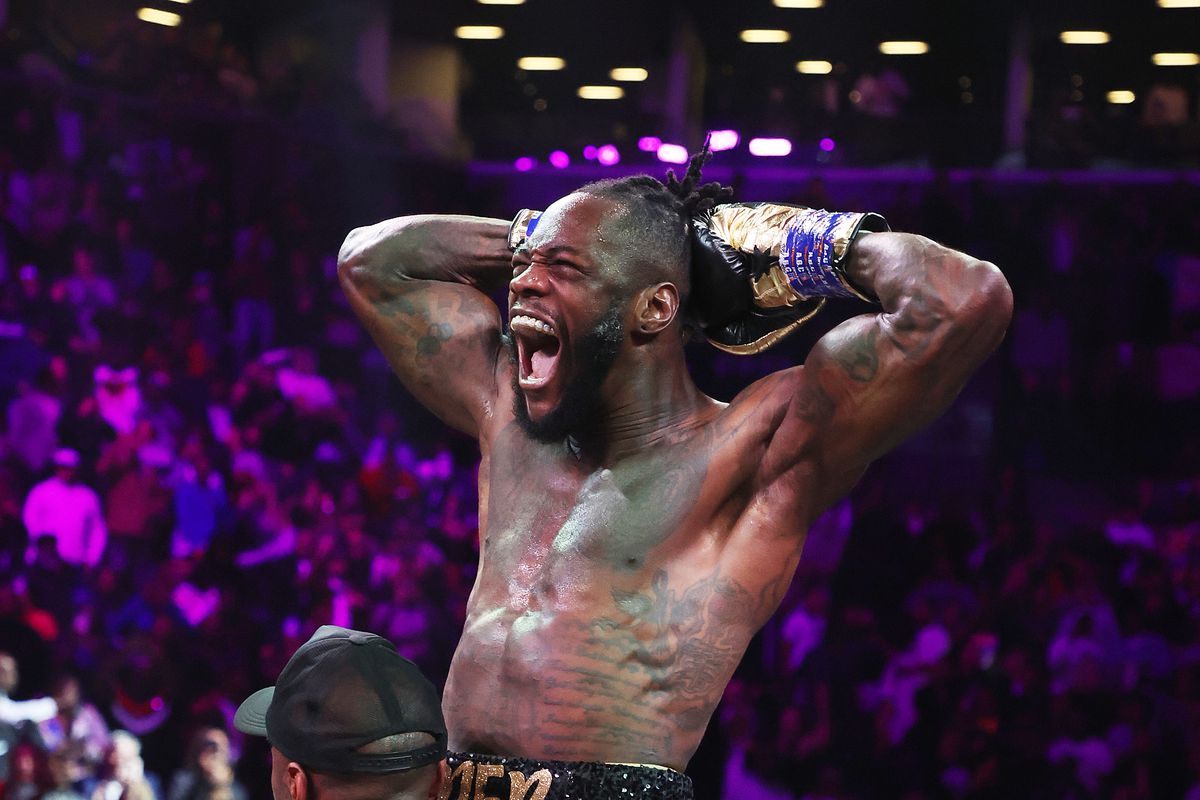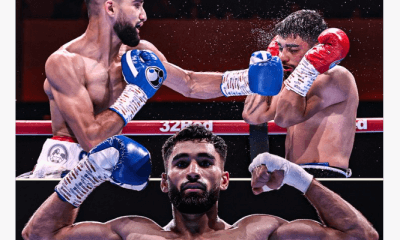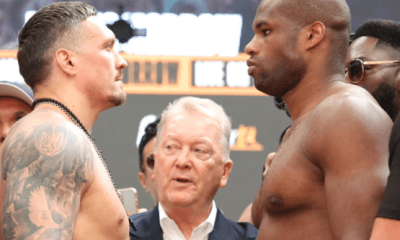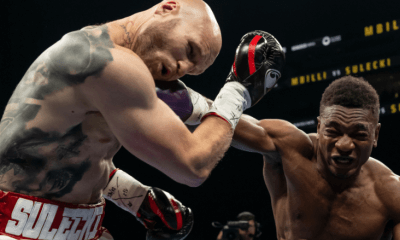Featured Articles
The Hauser Report: The Return of Deontay Wilder

The Hauser Report: The Return of Deontay Wilder
Deontay Wilder, as expected, confirmed his status as a major player in the heavyweight division with a one-punch, first-round round knockout of Robert Helenius at Barclays Center on Saturday night.
Wilder, age 36, had fought twice in the preceding 34 months and been knocked out each time by Tyson Fury. Those fights showed that Deontay is exciting to watch, brave, and tough. They also showed that, while he takes a good beating, he doesn’t take a particularly good punch. And his defensive skills, such as they are, are rooted in his offense.
In some ways, Wilder’s irrational, mean-spirited response to his first defeat against Fury caused as much damage to his image as Fury’s fists did. After that loss, Deontay claimed that the costume he’d worn during his ring walk was too heavy and had robbed him of his strength. Then, without evidence, he accused Fury of fighting with loaded gloves and referee Kenny Bayless of either being drunk on fight night or taking part in a conspiracy against him. Finally, again without evidence, he claimed that Mark Breland (his trainer at the time) had tampered with his water bottle and prematurely stopped the fight.
All of that ran counter to the narrative that Premier Boxing Champions (Wilder’s promoter) was trying to build in support of the notion that Wilder is a role model. After Deontay’s second loss to Fury, in the pursuit of image control, PBC issued a statement in his name that read in part, “I would be lying if I said that I wasn’t disappointed in the outcome. But after reflecting on my journey, I now see that what God wanted me to experience is far greater than what I expected to happen. We didn’t get the win, but a wise man once said the victories are within the lessons. I would like to congratulate Tyson Fury for his victory and thank you for the great historical memories that will last forever.”
That was preferable to the diatribe that had followed loss number one. But then, when asked by Brian Custer during a September 2022 interview whether he would consider a rapprochement with Fury, Wilder replied, “Nah, never, because I know the truth behind that. I don’t condone cheating and shit like that. I know that no matter what people say. You got analysts that say, ‘If he did have something in his glove, why did you not go to the authorities?’ Why the f*%! would I go to the authorities when I have an opportunity to release my own energy and put my hands up on him in the possibility of trying to kill him and get paid millions of dollars doing it. Okay, go to the authorities and they lock him up. Then what’s next? That’s it. We proved our case. Nobody getting fed. What justice has that done? That don’t make no sense.”
In sum, people have grown accustomed to strange ramblings from Wilder. Indeed, in a February 2022 podcast with Byron Scott, Deontay addressed his decision-making process regarding his ring future with the advisory, “I’m thinking about doing Ayahuasca [a psychedelic tea that originated in South American religious rites]. That’s gonna be my decision-making process. Boxing’s put a bad taste because of what it’s done to me. It’s dangerous, politics, cheating.”
Here, one might note that Healtline reports, “Those who take Ayahuasca can experience symptoms like vomiting, diarrhea, feelings of euphoria, strong visual and auditory hallucinations, mind-altering psychedelic effects, fear, and paranoia. Some experience euphoria and a feeling of enlightenment while others go through severe anxiety and panic.”
Sounds like a plan.
Then, in May, Wilder announced during the unveiling of a statue in his honor in his hometown of Tuscaloosa that he would fight again and proclaimed, “I’m coming back on popular demand because that’s all I’ve been hearing from high and low. From homeless people all the way up to millionaires. You feel me? It’s just been an amazing feeling. So many people reaching out, telling me it’s important because, without an American, heavyweight boxing really isn’t exciting.”
Later, Deontay augmented that sentiment to include, “I knew that I had to come back because I motivate and inspire so many around the world. What really got me back to this point was like, damn, the world really needs me.”
The designated victim for Wilder’s comeback fight was Robert Helenius. Born in Sweden, now living in Finland, Helenius had compiled a 31-3 (20 KOs) ring record marked by two victories over Adam Kownacki and marred by stoppage losses at the hands of Gerald Washington and Johann Duhaupas. During the Wilder-Helenius promotion, he was hyped as “Finland’s finest” (which is a bit like being a snowball’s warmest).
Helenius had never beaten a world-class fighter and wasn’t about to start on October 15. If one were to take a computer and design a perfect opponent for Wilder to stop in two rounds or less, Robert would be the guy. Years ago, I described him as having the movement of a stalagmite. Now 38 years old, he had gotten slower and easier to hit since then.
Wilder had sparred with Helenius numerous times preparatory to fighting Tyson Fury. That experience confirmed that Helenius was a “safe” opponent. Very safe. The feeling was that this would be a payday for Deontay, not a test.
Neither Wilder nor Helenius attended the August 30 kick-off press conference at Barclays Center, addressing the media electronically instead. Later, Deontay declared, “October 15 is the return of the king. My second reign is going to be filled with joy and excitement for me and those who support me.” Wilder also advised, “I want to get back to the big fights and to giving the fans what they want to see. I’m doing it for the people this time.”
One might question whether charging $74.99 to see Deontay fight Helenius on pay-per-view was doing it for the fans or to the fans.
October 15 promised to be a long night at Barclays Center with eleven bouts on the card. The first fight was scheduled to begin at 5:00 PM. The four-bout pay-per-view telecast didn’t start until nine o’clock.
The early undercard bouts were contested in a virtually empty arena and distinguished by the fact that, in one of them, both fighters (Keeshawn Williams and Julio Rosa) wore pink trunks.
In the first pay-per-view bout of the evening, Emmanuel Rodriguez dominated Gary Antonio Russell throughout the fight. Then, in the latter stages of round nine, Russell headbutted Rodriguez, who suffered a cut beneath his right eye and fell to the canvas, stunned. Rodriguez appeared to be in no condition to continue. But inexplicably, referee Benji Esteves (who has Magomed Abdusalamov vs. Michael Perez and Arturo Gatti vs. Joey Gamache on his refereeing resume) allowed the fight to go on. Fortunately, there were only fifteen seconds left in the round. Rodriguez survived those seconds, after which Nitin Sethi (chief medical officer for the New York State Athletic Commission) stopped the bout. The fight went to the scorecards because it had been terminated as the result of a headbutt (ruled “accidental” by Esteves – a questionable determination) and Rodriguez won a lopsided unanimous decision.
Then Frank Sanchez stopped Carlos Negron in round nine of a predictably one-sided fight that referee Ricky Gonzalez stopped at precisely the right time.
That was followed by the co-featured bout of the evening – Caleb Plant vs. Anthony Dirrell in a fight styled by the WBC as a 168-pound title-elimination contest.
One year ago, Plant had a 21-0 record with 12 knockouts and was the IBF 168-pound beltholder. Then he learned the hard way in a knockout defeat that Canelo Alvarez is better than Caleb Truax, Vincent Feigenbutz, and Mike Lee (the guys Plant had defended his title against).
Dirrell, who came into the bout with a 34-2-2 (26 KOs, 1 KO by) ring ledger, is seven years older than Plant. Eight years ago, Anthony held the WBC 168-pound belt before losing to Badou Jack in his first title defense.
At the August 30 kick-off press conference, Dirrell had played the role of loud-mouthed instigator, calling Plant a pussy, etcetera, etcetera, and so forth. His infantile behavior continued through the final pre-fight press conference.
Plant took it all in stride, responding, “I definitely feel there’s a lot of jealousy there. I don’t give a fuck about where he’s from or what he says. That don’t mean nothing to me. When I beat him, it will be because I’m better than him. But he already knows that.”
Plant was an 8-to-1 betting favorite.
The fight began with Dirrell, the quicker man, looking to counter. Plant kept trying to get untracked and make something happen but couldn’t. Dirrell fought a chippy fight, fouling repeatedly in the clinches. That should have earned a warning followed by a point deduction but didn’t. Finally, in round eight, Plant took matters into his own hands and threw Dirrell to the canvas during a clinch.
Meanwhile, Dirrell had slowed down and was posturing more than fighting. The boos from the crowd were raining down.
In round nine, the boos turned to BOOM!
Plant hooked to the body and followed with a hook up top that landed flush on Dirrell’s jaw, rendering Anthony unconscious. Immediately after the knockout, with Dirrell still out cold, Caleb pantomimed shoveling dirt onto his grave.
Bad feelings between the two? Absolutely! Dirrell had been shooting off his mouth throughout the promotion as though he were to have the final word on the subject. He didn’t.
Then it was time for the main event. Wilder was a 7-to-1 betting favorite. His presence at the top of the card made the evening a happening even if Wilder-Helenius didn’t shape up as a competitive fight. That said; ticket sales had been slow. It took steep discounts and a lot of freebies to fill in the lower regions of Barclays Center. No celebrities were shown on the big overhead screen at ringside.
It should also be noted that no sport other than boxing starts its signature competitions a half-hour after midnight. Fans who had arrived at Barclays Center when the doors opened had spent more than eight hours in their seats when the bell for round one of Wilder-Helenius sounded.
They didn’t have to wait long afterward.
Wilder is a vicious puncher with an aura of menace about him. Opponents know that he wants to hurt them, short-circuit their brains. And with a single punch delivered at any time, he can do it. His record (now 43-2-1 with 42 knockouts) stands testament to that fact.
This was the first time since 2019 that Wilder had fought someone other than Tyson Fury. It had to be a relief for him to see someone other than The Gypsy King standing across the ring from him when the bell for round one sounded. Helenius had promised to bring his A-game. And maybe he did. But the fight was about Deontay, not Robert.
Helenius moved forward clumsily at the opening bell behind a pawing jab that he brought back slowly and low. Wilder bided his time; waited until Helenius leaned forward head-first while overreaching with a lunging left to the body that fell short; and closed the show with a compact righthand that landed smack in the center of Robert’s face at 2:57 of the first stanza. Referee Michael Griffin didn’t bother to count. Helenius was unconscious before he hit the canvas.
As for what comes next; on September 6, WBC president Mauricio Sulaiman announced that the winner of Wilder-Helenius would face Andy Ruiz in a final elimination bout to determine the mandatory challenger for Tyson Fury’s WBC title. If Fury were to retire, presumably Wilder-Ruiz would then be for the WBC belt. Or the WBC might engage in some sort of slight-of-hand nonsense, designate Fury a “franchise” champion, “super” champion, or some other kind of champion, and proclaim that the winner of Wilder-Ruiz will be the WBC “world” heavyweight champion.
Twenty-nine men held a recognized version of the heavyweight championship between 1885 (John L. Sullivan) and 1979 (Larry Holmes). Then the world sanctioning organizations and their enablers took control of boxing. There have been 53 claimants since then. That’s 29 champions in 94 years as opposed to 53 “champions” in 43 years. Those numbers speak for themselves.
Meanwhile, a lot of knowledgeable people think that Deontay Wilder is the second-best heavyweight in the world today. I’m one of them.
Thomas Hauser’s email address is thomashauserwriter@gmail.com. His most recent book – In the Inner Sanctum: Behind the Scenes at Big Fights – was just published by the University of Arkansas Press. In 2004, the Boxing Writers Association of America honored Hauser with the Nat Fleischer Award for career excellence in boxing journalism. In 2019, Hauser was selected for boxing’s highest honor – induction into the International Boxing Hall of Fame.
To comment on this story in the Fight Forum CLICK HERE
-

 Featured Articles3 weeks ago
Featured Articles3 weeks agoResults and Recaps from New York Where Taylor Edged Serrano Once Again
-

 Featured Articles6 days ago
Featured Articles6 days agoThe Hauser Report: Zayas-Garcia, Pacquiao, Usyk, and the NYSAC
-

 Featured Articles3 weeks ago
Featured Articles3 weeks agoResults and Recaps from NYC where Hamzah Sheeraz was Spectacular
-

 Featured Articles4 weeks ago
Featured Articles4 weeks agoFrom a Sympathetic Figure to a Pariah: The Travails of Julio Cesar Chavez Jr
-

 Featured Articles2 weeks ago
Featured Articles2 weeks agoManny Pacquiao and Mario Barrios Fight to a Draw; Fundora stops Tim Tszyu
-

 Featured Articles3 weeks ago
Featured Articles3 weeks agoPhiladelphia Welterweight Gil Turner, a Phenom, Now Rests in an Unmarked Grave
-

 Featured Articles2 weeks ago
Featured Articles2 weeks agoArne’s Almanac: Pacquiao-Barrios Redux
-

 Featured Articles4 weeks ago
Featured Articles4 weeks agoCatterall vs Eubank Ends Prematurely; Catterall Wins a Technical Decision






















